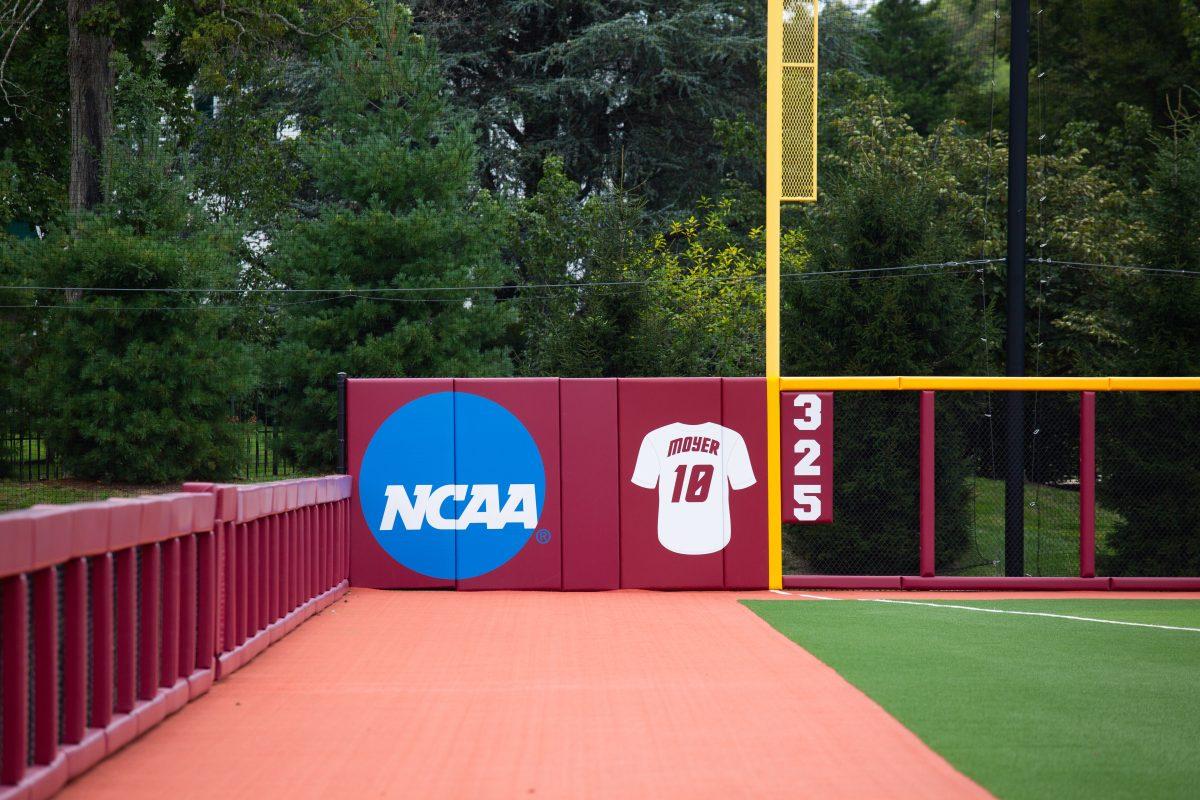Hawk great, Jamie Moyer, is the only player to ever have his number retired in St. Joe’s baseball program history. Moyer pitched at St. Joe’s from 1982-1984.
Moyer’s white number 10 home jersey is commemorated on the maroon outfield padding, not too far from the left field foul pole on Smithson Field.
The newly installed padding that lines the turf outfield of Smithson field, which serves as a backdrop for Moyer’s retired number, is a far cry from what Moyer used to call home field.
In the early ‘80s, the Hawks played most of their home games at the polo fields of Bryn Mawr and found themselves scrambling to find a place to practice in the offseason, often having to go into the newly built fieldhouse after hours or practice in the parking lot.
“It’s very humbling,” Moyer said. “What a beautiful field they have now. I wish we had that type of a field when I played at St. Joe’s, but it just goes to show how far the program has come. We had to do it a different way, but you’re still playing the same great game of baseball.”
The game of baseball has indeed been great to Moyer. Arduous practices at St. Joe’s payed off. His 25 year MLB career has landed him a spot on the 2018 National Baseball Hall of Fame ballot. He is already a member of the Seattle Mariners hall of fame.
For many St. Joe’s students, however, they will remember Moyer’s performance on baseball’s biggest stage right here in Philadelphia. At 46 years old, he dominated the Tampa Bay Rays for over six innings to win game three for the Phillies in the 2008 World Series, which they went on to win.
“That was my boyhood dream,” Moyer said. “Most kids who play baseball have that dream. As a little boy if you have passion for the sport, you lay in bed and dream about it. And for me watching the Phillies on TV and watching my idol Steve Carlton pitch, all these things were my happy place.”
Moyer, born in Sellersville, Pa., grew up a Phillies fan and his number 10 was worn to emulate Phillies great Larry Bowa.
Although they played different positions, Moyer tried to model his game after Bowa. Both were undersized and predicated their games on baseball smarts, work ethic and quickness, according to Moyer.
“He was a hustler and my dad growing up taught me to hustle,” Moyer said.
Moyer’s hustle characterized his MLB career, but hasn’t stopped since his retirement in 2011. He lives on the West Coast now, but is deeply involved in the Philadelphia area, where the Moyer Foundation operates. His presence also continues to be felt in the St. Joe’s baseball community.
“It’s wonderful to have a guy like Jamie who is an alumni of not only the university, but the program,” said St. Joe’s head baseball coach Fritz Hamburg. “Jamie has been tremendous in his involvement with our program. I’m ecstatic that he has remained involved the way he has. It means a lot to us and I think it means a lot to him as well.”
There is no mistaking what the St. Joe’s community means to Moyer. He was the keynote speaker at the program’s Leadoff Dinner twice and returns to talk with players and share his stories when he can.
“I’ll always be appreciative of that opportunity that I had at St. Joe’s,” Moyer said. “Not only to be an athlete, but also to be a student, to allow me to further my education and eventually get my degree and move on to a professional baseball career.”
As for Moyer’s successors, the Hawks will play their first season with his retired jersey overlooking the field.
“It’s something we wanted to do to recognize Jamie for everything he has meant for our program here,” Hamburg said. “We felt it was something Jamie definitely deserved.”
For Moyer, the legacy he has left on Hawk Hill may be one of most important achievements of his career. The respect that he has earned across all levels of baseball fulfill what he set out to accomplish through America’s pastime.
“I would hope that people who knew me or played with me would remember me as a player that played the game the right way and respected the game,” Moyer said. “I tried to play the game humbly. Those were all big things to me, that’s how I was taught how to play the game and I would like to think I played it that way as a college baseball player and definitely that way as a professional.”
Luke Malanga ’20 contributed to this story.







































